068: On Mimesis
on the putative demise of Twitter, self-representation, Aristotle, Oscar Wilde, and why we all need to be seen + Doodle Dispatches does work emoji and a podcast about plaid
I realized this week that the reason why some of us are in a state of near-panic about the (remote) possibility of losing Twitter is that we secretly believe it’s the last place where we can feel seen.
This is not a small thing. Being seen is a matter of survival. It’s how you get access to your tribe, whether it’s with the Swifties, or crypto bros, or K-hive, or #geospatial people, etc.
As is so often the case with the revelation of a root cause, there is tremendous freedom and possibility here. But, to get to the freedom part we got to talk about a lil something called mimesis.
I learned about mimesis in college, but had completely forgotten about it until a couple of weeks ago when I read this tweet by Brandon Taylor, of Real Life and
:
You can click for the context, but for now it’s enough to say that the phrase release yourself from the mimetic drive went off like a bomb cyclone in my brain and sent me running to find the most stuck up book that I own:


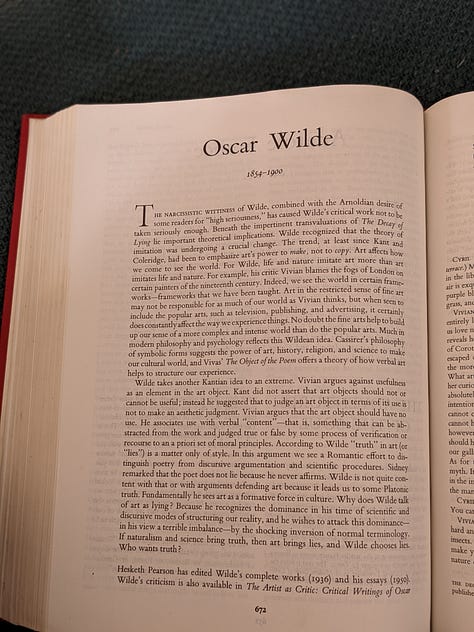
It was all there waiting for me in Critical Theory Since Plato. Our instinct to represent our selves and our experience of the world—to, as we say, “put ourselves out there”—is strong, innate, and pleasurable. Mimesis begins with recorded human history.
It started when Plato affirmed the existence of abstract ideas as distinct from the external world and the world of thought. He made a place in philosophy for the idea of mimicry or ‘copies’ or ‘representations’ of selves and objects as an artistic impulse, but he said that these copies of things are not as good as the real thing, because they are shadowy and inexact and thus dishonest. Which, fair—the real me is of a higher quality and more true than a Zoom call with me, or a photo of me or a description of me.
Then, Aristotle came out in his “Poetics” and said hold up, bro, can we not throw the baby out with the bathwater, because it’s really quite pleasurable, in its own way, to look at a drawing or read a description of something and what’s wrong with that? He also pointed out that men (and of course it is only men who can think and have philosophies, women are just inferior copies of men or vessels for producing male babies) are more inspired by such representations than they are by boring old philosophy or history. He said, “the reason why men enjoy seeing a likeness is, that in contemplating it they find themselves learning or inferring, and saying perhaps, ‘Ah, that is he.’”
And thus commenced two and a half millennia of aesthetic theory which has brought us, inexorably, to the invention of the selfie. Yay humanity.
*
But wait. Since my copy of Critical Theory Since Plato is already open, let’s first take a quick stop in the second half of the 19th century to look at Oscar Wilde’s “The Decay of Lying.” Wilde, being the white hot trail blazer that he was, pointed out that not only is artistic representation pleasurable and inspiring, but when done well, it shapes reality and not the other way around. Here are his famous, glorious lines:
Where, if not from the Impressionists, do we get those wonderful brown fogs that come creeping down our streets, blurring the gas-lamps and changing the houses into monstrous shadows? To whom, if not to them and their master, do we owe the lovely silver mists that brood over our river, and turn to faint forms of fading grace curved bridge and swaying barge? The extraordinary change that has taken place in the climate of London during the last ten years is entirely due to this particular school of Art. You smile. Consider the matter from a scientific or a metaphysical point of view, and you will find that I am right . . . There may have been fogs for centuries in London. I dare say there were. But noone saw them, and so we do not know anything about them. They did not exist till Art had invented them
Wilde is a master satirist, so he’s exaggerating to make his point here, but you, like his reader, would do well to do more than smile at this idea. Think about it. Which is more real? The you that you put into the world through social media? The you who puts on your favorite leather jacket or crisply tailored shirt or red lipstick and goes out to the bar with your friends? The you who presents at work? The you who texts silly memes to your friends? The you who sleeps spoon style with your beloved? Or your kid? If Plato came to you and asked you to pick the factually denominative, most real version of you, which one of these would you pick?
I thought so.
Wilde was concerned about a culture that had started to elevate verisimilitude over vision. He was writing as the effects of the industrial revolution had taken hold and could see the risk of privileging facts and ontologies over ideas and creative expression. You might even say that he was foreseeing the rise of a certain kind of engineering thinking. In his essay, Wilde goes on to say that "if something cannot be done to check, or at least to modify, our monstrous worship of facts, Art will become sterile and beauty will pass away from the land."
Which, if you’re me, brings us immediately to the last couple weeks on Twitter, where several million people lost their minds over the actions of one very rich man who broke a bunch of rules. To me, it is a “monstrous worship of facts” to get very upset over who gets a blue check and who gets to tweet and who doesn’t get to tweet and how much we might have to pay to read some tweets. I’m not saying it’s not a frightening time to be alive—it is a very frightening time to be alive. I’m saying that we are very confused if we think that our biggest problem is who is in charge of content moderation on the 14th most used social media platform.
Before you become angry with me, please know that I say this as someone who uses and feels protective about Twitter and thinks it’s better than most other social media and that it has and could still function as a global commons. Also, I care very much about democracy and would happily eat the rich if given the opportunity.
Let me try to put this in the form of a dialog.
Oscar Wilde: Speaking as someone who got sent to do hard labor in a prison camp because of my sexual preferences, why are you so upset right now?
Twitter users: Elon is obscenely rich and very annoying and did a weird photo op with a sink and let Trump back onto Twitter and wants to create a fascist oligarchy on Mars.
OW: If he is a wealthy man, why does he dress so badly?
TU: That is not the point, the point is that he says horrible things and is letting anyone get a Blue Check who can pay for it, and he unfairly fired people who have made six figures ever since they got out of college and only gave them three months of severance, so now we can’t in good conscience use the Twitter machine anymore.
OW: Why is it bad that anyone who wishes to use the Twitter machine can obtain the coveted Blue Check? I think a Blue Check sounds like something I would use and benefit from, but in my era I would not have been able to have one for the aforementioned reason.
TU: That’s why we can’t use it! We have to have solidarity with people like you because Twitter must be safe.
OW: But you just said that anyone can get a Blue Check. Isn’t that a good thing? I would probably be live-tweeting The Importance of Being Earnest right now if I was in your situation.
TW: Only people who pay $8/month can get it.
OW: Is this a lot of money in 2022?
TU: No, but now we have to pay for it where before it was free. And, people we don’t like can also have it if they pay for it.
OW: And who are these bad people who are paying a small amount to obtain the Blue Check?
TW: Well, there are people who are parodying big companies and saying the truth about how they charge a lot of money for life-saving drugs that should be free and other things which is causing their stock to go down. Also, Donald Trump.
OW: hmm
TU: So, yeah, we can’t use the Twitter machine anymore and that means the end of democracy, independent writing and journalism, and puppy memes.
OW: What do you mean you can’t use it? Can you still type words into your typing machine that describe the beauty of the fog coming off the Thames or your big feels about the handsome young Irish actor, Paul Mescal?
TU: Yes. We can. But—
OW: Why is it bad that the badly dressed billionaire man is breaking the rules? I broke the rules, and I am a goddamn hero. What is the problem here?
TU: Twitter was the last Commons where we could easily learn about facts and news and ideas and exchange clever quips because every other place is owned by The Algorithm. Now, things are uncertain.
OW: Ok, now, I think understand a bit better. Are you saying that all the changes mean that you are not sure where you will go to meet people and have people meet you and where you can be clever together?
TU: Yes.
OW: Is there really no other Commons? Are there no parks or backyards with firepits or bars or restaurants or inns or poetry readings in your world? Are you sure? Have you looked for the ones that are downstairs or behind unmarked doors? I personally know of many of these and they are some of the best ones.
TU: Yes, those places exist, but we had a pandemic and that sucked and made things weird, and there are wars, and this thing called Supply Chain Shock and it’s exhausting. We are used to being able to visit an online Commons from our couches while wearing our sweatpants.
OW: I am sympathetic to the ravages of capitalism, which seem very dire. However, why would anyone want to wear sweatpants all the time? Who are these Algorithm Overlords? Can they sentence you to hard labor with rocks like they did me? No? Then, what are you even crying about? Why do you care about the weird billionaire with the weird hair? Get up off of your sofa and put down your typing machine. Put on your waistcoat and powder your nose and go out and let yourself be seen and heard. Like my friend Walter Whitman who lives in the American colonies has said, go out and sound [your[ barbaric yawp over the roofs of the world.
TU: 🥺
*
What’s super weird about the ruckus over Twitter is that the creative class (writers, journalists, etc.) are in some ways the most angry about the rule-breaking and the possibility of change. It’s like we got so used to our shitty ration of 280 characters at a time that we forgot that we all used to do things like write entire websites and books, and start whole newspapers, and make films and plays that are longer than Reels and TikToks, and make visuals that aren’t just commands to AI machines.
For example, I saw this tweet this week:
And I thought, this is genius. This is Art. Our collective creative impulses are still more powerful than the algorithm and definitely more powerful than Elon Musk. When did we forget this?
*
Look. It’s ok that we want to represent ourselves. It’s ok that we want to find an audience for our creative expressions and our commentary and our photos of our gardens. It’s ok that we get dopamine hits for putting our identity online and finding our digital tribe. We are wired to connect.
It’s even ok that we want to put our mimetic coins into the digital content slot machine with the hope of hitting the viral jackpot. It’s human. It’s life instinct. Good for us. Technology has given us a new and niche area for representing ourselves. For example, I stumbled on this series from 2009 amongst my photos this week:
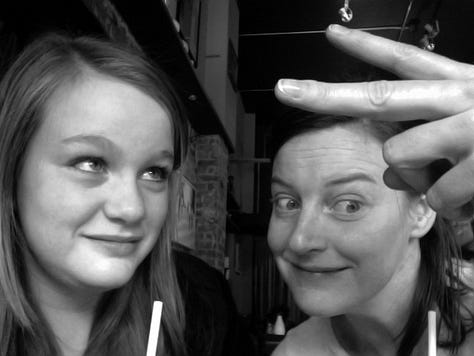

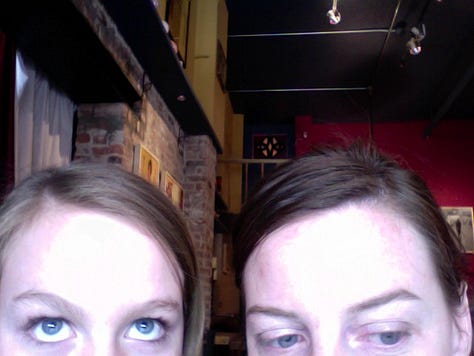
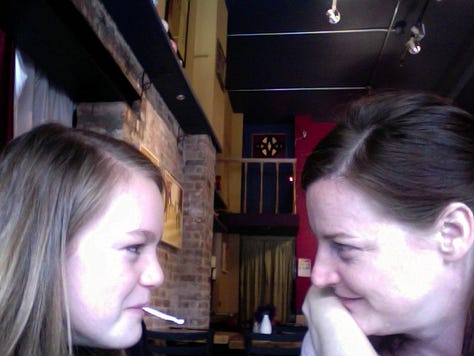
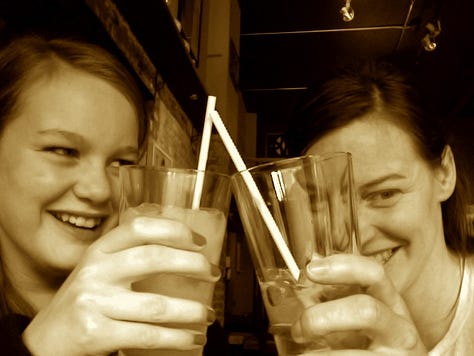

Thank you, Apple photo booth, for this artistic representation of enjoying a beverage with my 14 year old child.
We just have to remember that we are not the sum total of our followers or our reach and that the technology that we use is not one and the same with person who is represented as owning it.
As of this moment, I have 107 followers on Twitter, which is not helpful in any way to anything I want to do along the lines of publishing the things I write and is about 4900 fewer than I had when I deleted my original account in 2017, but who cares. Am I any less of a person now than when I had that so-called ‘influence?” No. In fact, I am more vital and powerful now than I ever was back then, and I meet more people who are like me and do more interesting things. So who cares about the Blue Check?
Yes, I do not love it when I bump up against people whose representations about themselves or the world are not like mine and/or are offensive. And, as someone who knows what it’s like to be stuck inside a fundamentalist tribe, I also don’t like it when any one tribe has representations that eclipse that of every other tribe. I’m not alone in this: Brandon Taylor’s tweet was in response to a lot of people who were criticizing a woman for tweeting that she loved having long, leisurely conversations with her husband over their morning coffee. (Imagine the nerve!) Her experience didn’t match their experience and it made them angry. They wanted their representation of themselves to be represented back to them by this woman, even though all she wanted was to have coffee with her husband.
But wanting this is a warped and twisted form of the mimetic impulse. It’s not what we need and it’s not actually going to make us happy if we get it. The point isn’t to have everybody have the exact same representation of themselves and the world in some caricature of extreme cultural alignment. My god what a shitty and boring world that would be. The point is to be seen for who you are, in all of your wacky, weird, ways of being, and in so doing, send a shining signal to your fellow barbarians so that they can find you, and you can find them, (which is something I wrote about in this post).
We have forgotten the possibilities that are intrinsic to our own weirdness, and that of others, in some kind of profoundly terrifying way. We see the tweets of a billionaire, and we think that is the only reality. It is not. It is one person’s mimesis of his particular world. Yes, it is a person with a lot of reach, but it is still just one single representation of reality. Yours is just as important. Believe me.
Here’s a fun question: What did you do to represent yourself before social media? Go ahead, I’ll wait:
Maybe you wore a jersey from your favorite football team or lace leggings, high-heeled pumps, and 20 lbs of necklaces, including a giant crucifix. Maybe you wore an oversized plaid shirt. Or frequented Ska bars. Or stood in line to see Justin Bieber. Or read about cellular automata. Or built computers from bootlegged parts smuggled behind the Iron Curtain.
Unless you are ten years old, then you remember things like this.
(If you are ten years old and are reading this, I love you and TYSM and email me b/c you’re getting a free lifetime subscription to SBB).
Here’s another question: Why do you care what a bunch of engineers in Silicon Valley think?
The less you care, the more authentic you’ll be and authenticity still beats the algorithm for a little while longer, at least. So let’s have some fun while it lasts.
Go out and represent yourself in any way you want to and be proud of yourself for doing it. Aristotle said so. And Oscar Wilde. And me. Go forth and do your own mimesis.
Yes? No? What am I missing? Let me know:
Four Excellent Emoji
Last week, I wrote about how I need better emoji. Doodle Dispatches went out and created four new ones, just as effortlessly as usual.





Click to download these and read the captions. Also, don’t forget the Doodle Dispatches holiday shop has everything you need and want for this year’s holiday season and is not owned by another oligarch who shall remain unnamed.
Stuff You Won’t Get From the Algorithm
This podcast on the topic of “plaid” (Yes, for real.)
- 's magnificent essay on how writers are fine, with or without Twitter.
Reasons Why:
This week’s reason why you should become a paying subscriber is that Substack will give me the Substack equivalent of a Blue Check if I get a certain amount of paid subscribers, and even though I believe everything I said above, the people who decide what book writers are paid look for things like Blue Checks. An annual subscription is just $3.33/month or $40/year if you use the discount button below.
This week’s reason to sign up to be in the forthcoming 2023 Book Survivalists book club is that I keep changing my mind about how I want to do it and you can influence the direction by signing up—
—and dropping a comment about what you’d like it to look like. What do you want to read? How often do you want to meet? What would make it worth your time? I want to do something new and fun that builds authentic connections—am I asking too much?
Browse the archive| Become a paid subscriber | Get a t-shirt | Find SBB on Twitter


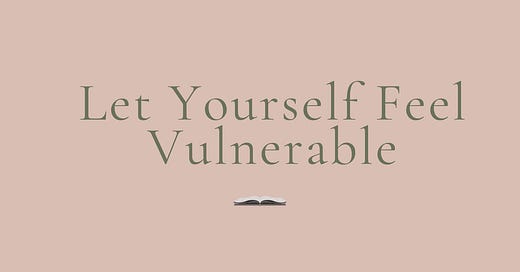




I can’t fully remember how I represented myself before social media. Having a baby in 2011 wrote over a bunch of memory. Letters, maybe? A lot of emails? Gardening? I quilted for a while in my early 20s. One abstract quilt each Christmas for three or four years. I had no quilting skills but a lot of time and fabric.
The baby is 11 now, and they are the kind of kid who might like SBB, unless they are already playing Minecraft, so I will be sharing issue 68 with them.
Love this so much, Courtney. Absolutely adoring you bringing Plato, Oscar Wilde, and Whitman into this conversation with Elon Musk. Yes, let's all gang up on the Algorithm and go out and connect. Grateful for you.